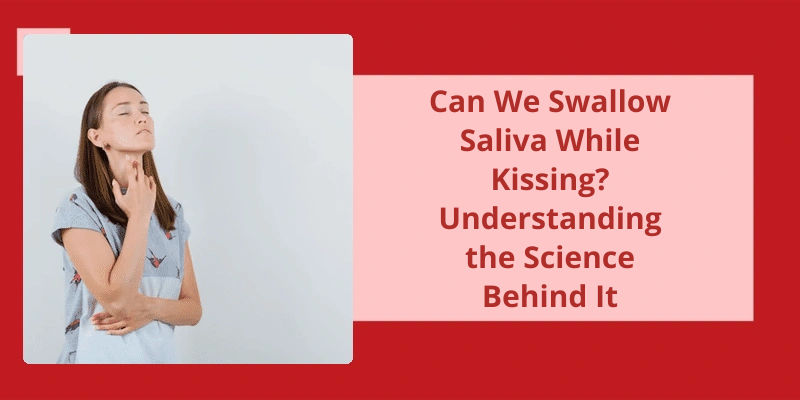As such, it often involves the sharing of bodily fluids, including saliva. While some may find the idea of swallowing their partner's saliva off-putting or uncomfortable, in reality, it’s a natural aspect of the kissing experience. In fact, swallowing saliva during a kiss is generally considered to be safe and even beneficial for one's oral health. However, it’s important to note that there are certain circumstances in which swallowing one's partner's saliva may pose a health risk.
Can I Drink My Gf Spit?
However, drinking your girlfriends spit may not be the best idea for a few reasons. Firstly, it could be considered unsanitary, especially if your girlfriend has any underlying medical conditions or diseases. Secondly, consuming large amounts of another persons saliva could potentially upset your stomach and lead to digestive issues. Additionally, it’s important to consider personal boundaries and whether or not your girlfriend is comfortable with this type of activity.
It’s also important to consider the implications of this behavior on your relationship. While some couples may find this type of behavior playful and enjoyable, others may find it uncomfortable or even offensive. It’s important to communicate with your girlfriend about your desires and boundaries, and to ensure that you both feel comfortable and respected in your relationship.
Overall, while it’s generally safe to swallow your partners saliva during kissing, it isn’t advisable to drink large amounts of it. Factors such as personal preferences, hygiene, and health considerations should all be taken into account before engaging in this type of activity. Communication and respect for each others boundaries is key in any healthy relationship.
The Health Risks of Consuming Large Amounts of Someone Else’s Saliva
Consuming large amounts of someone else’s saliva can pose health risks as it can potentially transmit infectious microorganisms such as bacteria and viruses. This can lead to a range of illnesses, including colds, flu, strep throat, and other infections. It’s important to avoid sharing drinks, utensils, and other items that may come in contact with saliva to prevent the spread of germs and maintain good health.
Controlling saliva during kissing is an important aspect of romantic intimacy. Opening your mouth too wide can lead to excessive salivating and swallowing can help keep it under control. However, there are other factors to consider when it comes to a successful kiss that goes beyond just regulating saliva.
How Do You Control Saliva When Kissing?
The key to controlling saliva when kissing is to maintain a balance between moisture and dryness. It’s important to avoid opening your mouth too wide, as this can cause saliva to drool from your mouth and onto your partners face. Instead, try to keep your mouth closed and use your lips to create gentle suction. This will help keep saliva from escaping your mouth and onto your partner.
This may seem like a no-brainer, but it’s easy to forget in the heat of the moment. When you start to feel excess saliva building up in your mouth, take a quick break and swallow discreetly. This will help keep your mouth from becoming too full or moist, which can prevent accidental drooling.
For some people, excessive saliva production may be a sign of an underlying health condition such as acid reflux or dry mouth. They may be able to provide you with additional tips or recommend treatment options to help manage your symptoms.
Remember, kissing is all about intimacy and connection, so don’t be afraid to communicate and experiment with different techniques until you find what works best for you.
How to Deal With Excessive Saliva Production During Kissing Caused by Braces or Dentures?
- Make sure to clean your braces or dentures before kissing to reduce excess saliva production.
- Take breaks during kissing to swallow excess saliva and/or wipe it away discreetly.
- Communicate with your partner about the issue to ensure their understanding and willingness to work through it.
- Consider using kiss-friendly dental products or accessories, such as dental wax or mouthwash designed for dry mouth.
- If necessary, consult with your dentist or orthodontist for additional suggestions or solutions.
As important as saliva is for the overall maintenance of our oral health, the process of swallowing it’s so ingrained in our daily routine that we hardly even notice it happening. It’s a reflex action that helps us to keep our mouth and throat lubricated and prevents us from experiencing the sensation of a dry mouth. But occasionally, things can go wrong, and we may accidentally inhale saliva, causing discomfort and embarrassment. In this article, we’ll explore whether this is a cause for concern and what you can do to prevent it from happening.
Is It Normal to Swallow My Saliva?
This is called aspiration and can lead to coughing or choking if not corrected. Aspiration can be more common in people who’ve difficulty swallowing due to a medical condition, such as Parkinson’s disease or stroke. In these cases, it’s best to consult with a healthcare professional for proper evaluation and treatment.
Swallowing saliva is a natural reflex and completely normal. In fact, it’s estimated that an average person produces approximately 1 to 1.5 liters of saliva per day. The amount of saliva produced can vary depending on several factors, such as age, gender, and medication use.
Saliva contains enzymes that help to break down food in the mouth, making it easier to digest in the stomach and small intestine. Additionally, saliva helps to neutralize acid in the mouth and prevent tooth decay.
However, excessive swallowing of saliva may be a sign of an underlying medical condition such as acid reflux or gastroparesis. Acid reflux occurs when stomach acid flows up into the esophagus, causing heartburn and regurgitation. Gastroparesis is a condition that affects the normal contraction of the stomach muscles, resulting in delayed emptying of food from the stomach.
However, if excessive swallowing or other unusual symptoms are present, it’s important to consult with a healthcare professional for proper evaluation and treatment. Proper hydration, maintaining good oral hygiene, and avoiding tobacco and alcohol can also help to keep saliva production and swallowing functioning properly.
How Can Excessive Swallowing of Saliva Affect Oral Health?
- Excessive swallowing of saliva can lead to dry mouth, which increases the risk of tooth decay and gum disease.
- It can also cause bad breath and a burning sensation in the mouth.
- Chronic swallowing of saliva may contribute to the development of oral ulcers.
- People with certain medical conditions, such as Parkinson’s disease, may experience excessive saliva production, which can further exacerbate these issues.
Source: Choking on saliva: Causes and treatment – Medical News Today
It’s a well-known fact that oral transmission plays a significant role in spreading viruses and bacterial infections. The act of kissing or sharing food and drinks with someone who’s carrying these microbes can lead to their transmission. However, what happens if you swallow someone’s saliva? Let’s dive deeper into the implications of accidentally ingesting someone else’s saliva and the consequences it may have on your health.
What Happens if You Swallow Someones Saliva?
Depending on the type of microbe present in the saliva, the individual who’s consumed it may experience varying forms of illness. For example, if the person whose saliva was ingested has a viral or bacterial infection, the person who consumed the saliva may also contract the same disease. This can lead to severe symptoms such as fever, body aches, respiratory issues, or even death.
Saliva itself isn’t entirely harmful, as it contains natural enzymes that break down the food we eat. However, there are various instances where oral transmission of microbes through saliva can pose a threat to human health. This can happen in scenarios such as sharing utensils or drinks with someone who’s an infection, improper dental hygiene such as not brushing and flossing regularly, or simply kissing someone who may have a contagious disease.
In some professions, such as health care, there are strict protocols around saliva transmission and certain measures are taken to limit the potential spread of disease. These include wearing protective barriers such as gloves and masks, as well as ensuring all instruments are properly sterilized before use. In everyday life, it’s important to be cautious and mindful of the potential risks associated with saliva transmission.
It’s worth noting that the likelihood of contracting a disease from swallowing someones saliva is generally quite low but still present. Individuals who find themselves in scenarios where they’ve accidentally consumed someones saliva and are worried about potential illness should consult a healthcare professional. Early detection and treatment can be crucial in preventing the spread of disease.
Practicing good hygiene, such as regular hand washing and dental care, can help reduce the risk of infection. If you find yourself in a situation where youre worried about disease transmission, it’s always best to seek medical advice as soon as possible.
The Benefits of Saliva in Digestion and Oral Health
- Saliva helps break down food by moistening and softening it, making it easier to swallow and digest.
- Saliva contains enzymes that begin to break down carbohydrates and fats in the mouth.
- Saliva neutralizes acid in the mouth and helps prevent tooth decay and gum disease.
- Saliva contains antibacterial and antiviral properties that help fight off infections in the mouth.
- Saliva helps keep the mouth moist, which can prevent bad breath and promote overall oral health.
- Saliva helps repair and protect the oral tissues in the mouth.
While kissing is considered a common way to show affection or intimacy, it’s also important to remember that it can transmit many types of germs and diseases. From cold sores to glandular fever and even tooth decay, exchanging saliva with someone else can pose a small but significant risk to our health. Therefore, it’s essential to be mindful of these risks and take the necessary precautions to protect ourselves and our partners.
Is It OK to Exchange Saliva While Kissing?
Kissing is a beautiful way to show love and affection towards another person. When you kiss someone, your emotions are elevated and you feel more intimate and connected to them. However, there are certain things that you need to keep in mind before you decide to share saliva while kissing.
One of the main risks associated with exchanging saliva while kissing is the transmission of germs. Kissing can transmit many germs, including those that cause cold sores, glandular fever, and tooth decay. Cold sores are caused by the herpes simplex virus that can easily spread through direct contact with the blisters or across the skin that surrounds them. Similarly, glandular fever is a viral infection that can cause fatigue, swollen glands, and fever, and can also be transmitted through kissing. Another risk is tooth decay, which is caused by bacteria that live in your mouth and can be shared via saliva.
Diseases such as hepatitis B, mumps, syphilis, and even HIV can be transmitted through saliva. HIV may also be transmitted through infected blood, semen, vaginal fluids, and rectal secretions, so kissing shouldn’t be the only factor that you consider when assessing your risk of transmission.
These infections are caused by different types of bacteria and viruses that can spread from one person to another through saliva. If you or your partner have any signs of these infections, it’s better to avoid kissing until the symptoms disappear.
The Cultural and Historical Significance of Kissing as a Form of Intimacy and Affection
Kissing has been a common form of intimacy and affection across cultures and throughout history. It’s significance can be seen in literature, art, and religious traditions. However, the meaning and cultural norms surrounding kissing have also evolved over time and vary depending on context and place. Despite these changes, kissing remains a universal expression of love and connection that continues to hold powerful social and emotional importance.
Conclusion
It’s important to note that if either partner has an infectious disease or illness, such as a cold or flu, it’s advisable to refrain from kissing or exchanging saliva to prevent the spread of germs.






